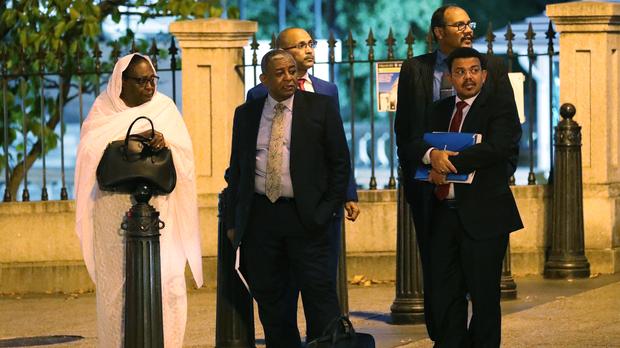
Egypt needs to agree Renaissance Dam deal

DR. ABDELLATIF EL-MENAWYJanuary 14, 2017

There are just hours left until the results of the latest crucial round of negotiations on the Grand Ethiopian Renaissance Dam (GERD) project, which are taking place between Ethiopia, Egypt and Sudan in Washington, are announced. The round kicked off on Monday, at the invitation of the US, to discuss what was reached in the four previous rounds of negotiations, which lasted for more than a month and had the participation of representatives of the World Bank and the US, as well as the foreign and water resources ministers of the three countries concerned.
The earlier rounds of talks, despite many statements of thanks and appreciation for hospitality, failed to reach a solution. The Egyptian irrigation ministry issued a statement after the end of the last round, in which it said the three countries could not reach an agreement due to the lack of clear measures from the Ethiopian side to preserve the capacity of Egypt’s Aswan High Dam while the GERD reservoir is filled, especially in periods of drought. It also said that the negotiations showed Ethiopia is not really seeking to reach an agreement and has always threatened to unilaterally fill the reservoir — a violation of international law and something Egypt will not allow to happen in order to preserve its share of the Nile’s waters, as stipulated in previous agreements.
Meanwhile, Ethiopian Water Minister Seleshi Bekele said there wasn’t an agreement because Egypt had suggested extending the period of filling the GERD’s reservoir to 21 years, when it prefers six. In a press conference after the last round, Bekele said that the Egyptian delegation attended the talks without the intention of reaching an agreement and that Ethiopia would start filling the dam in July. Bekele’s statement provoked the Egyptian Foreign Ministry, which issued a strong statement accusing the Ethiopian side of falsifying facts.
The Washington meetings might bring good news or create a new disagreement. But the scenario that is most likely to happen is to commit to article 10 of the Declaration of Principles signed in 2015 between the three countries, which gives the concerned parties the right to ask for mediation or refer the matter to their heads of states to discuss any disagreement.
Observers have previously determined the legal steps required to clinch an agreement on the GERD issue. The first step was holding talks and the second was resorting to mediators. The third step was to involve international entities, which happened recently with the US and the World Bank. The last option would be resorting to the International Court of Justice. However, some consider that a prior agreement should have been made between the three countries regarding the mechanism of the international arbitration and when it should be adopted, but these items were not included in the Declaration of Principles.
Looking to Washington might be the solution, since the US has ways of pressuring countries that can be utilized to push the three sides toward making concessions and reaching an agreement that satisfies everyone. America is expected to continue its pressure on the concerned parties to maintain peaceful negotiations and avoid further options.
The truth is that the US’ involvement in the dam issue is not new. When Ethiopia began its planning stage in 1958 — right after Egypt’s decision to establish the Aswan High Dam — the US sent a delegation from the Bureau of Reclamation to study the establishment of dams on the Blue Nile. After six whole years of study, the bureau finally published its first report. It made plans for 33 projects on the Blue Nile and its tributaries, including four big dams that would impound more than 70 billion cubic meters of water and generate 5,500 megawatts of electricity. In 1998, Ethiopia updated these projects to double the storage capacity of the dams, with its stated goal being to produce clean hydropower to be used locally and exported to neighboring countries. Will the US favor its initial studies or will it respect its very good relations with the current administration in Egypt?
In 2009, Egypt was delivered the feasibility studies of the Ethiopian dams. The plans included four dams with big reservoirs — Karadobi, Beko-Abo, Mandaya and Border— impounding more than 140 billion cubic meters and generating 7,100 megawatts of electricity. An Egyptian team reviewed the studies on these dams and found that they disregarded the dams’ potential negative impacts on Egypt. According to Cairo, if these dams were used for agriculture and power-generating purposes, its water shortage would reach 15 billion cubic meters per year and the electricity generation from the Aswan High Dam would fall by more than 50 percent. If the dams were used only to generate electricity, the water shortage would be 9 billion cubic meters yearly. Thus, Egypt managed in 2010 to prevent the implementation of the planned schemes.
The US has ways of pressuring countries that can be utilized to push the three sides toward making concessions.
Dr. Abdellatif El-Menawy
However, only a few months later and just after the January 2011 revolution took place in Egypt, Ethiopia announced it would begin the implementation of its plans to establish the GERD. Since that date, the course of negotiations has been clear and public. Successive administrations have exerted a lot of efforts, but some of them dealt with the situation with more goodwill than others, leading us to the current situation.
Anybody who thinks that the GERD issue has nothing to do with the other challenges facing Egypt — notably the crisis in Libya, the Arab-Israeli conflict and many other national issues related to its economic reforms — is wrong. For Egypt, the Nile’s water is an existential issue. Therefore, it is no longer useful to recall the previous mistakes made in managing this file. What matters now is saving what can still be saved and for Egypt to wage a true battle in policy and strategy.
- Dr. Abdellatif El-Menawy is a multimedia journalist, writer and columnist who has covered war zones and conflicts worldwide. Twitter: @ALMenawy